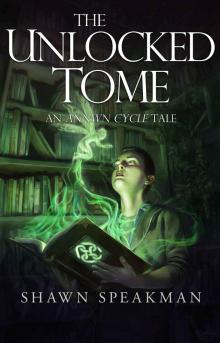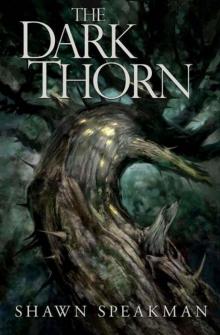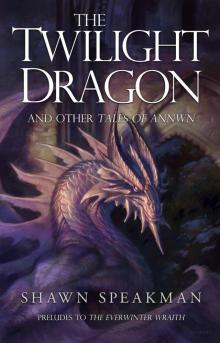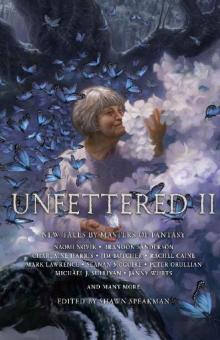- Home
- Shawn Speakman
Unfettered II: New Tales By Masters of Fantasy
Unfettered II: New Tales By Masters of Fantasy Read online
New Tales by Masters of Fantasy
EDITED BY
Shawn Speakman
Grim Oak Press
Seattle
Unfettered II is a work of fiction. All of the characters, organizations,
and events portrayed in these stories are either products of the
authors’ imaginations or are used fictitiously.
Unfettered II
Copyright © 2016 by Shawn Speakman.
All rights reserved.
“Brightwine in the Garden of Tsitsian Village” by Bradley P. Beaulieu.
© 2015 by Bradley P. Beaulieu.
“Day One” by Jim Butcher. © 2016 by Jim Butcher.
“Figures” by Rachel Caine. © 2015 by Rachel Caine LLC.
“The Hedgewitch” by Sarah Beth Durst. © 2016 by Sarah Beth Durst.
“The King’s Despatcher” by David Farland. © 2015 by David Farland.
“The Gunnie” by Charlaine Harris. © 2015 by Charlaine Harris.
“Bulletproof” by Mark Lawrence. © 2015 by Mark Lawrence.
“The Raven” by Erin Lindsey. © 2016 by Erin Lindsey.
“And Men Will Mine the Mountain for Our Souls” by Seanan McGuire.
© 2016 by Seanan McGuire.
“The Red-Rimmed Eyes of Tóu Mǎ” by Aidan Moher. © 2016 by Aidan Moher.
“Castle Coeurlieu” by Naomi Novik. © 2016 by Temeraire LLC.
“A Slow Kill” by Peter Orullian. © 2014 by Peter Orullian.
“Aokigahara” by John A. Pitts. © 2015 by John A. Pitts.
“A Duel of Evils” by Anthony Ryan. © 2015 by Anthony Ryan.
“The Thrill” by Brandon Sanderson. © 2016 by Dragonsteel Entertainment, LLC.
“Victim with a Capital V” by Scott Sigler. © 2016 by Empty Set Entertainment.
“The Last Flowers of the Spring Witch” by Shawn Speakman.
© 2016 by Shawn Speakman.
“Little Wren and the Big Forest” by Michael J. Sullivan. © 2016 by Michael J. Sullivan.
“Magic Beans” by Django Wexler. © 2015 by Django Wexler.
“The Decoy” by Janny Wurts. © 2016 by Janny Wurts.
All rights reserved.
Dust jacket artwork by Todd Lockwood
Interior chapter illustrations by Don Maitz
Copyediting and book design/composition by Rachelle Longé McGhee.
Signed, Limited Edition ISBN 978-1-944145-09-5
Trade Hardcover Edition ISBN 978-1-944145-05-7
eBook ISBN 978-1-944145-08-8
First Edition, December 2016
2 4 6 8 9 7 5 3 1
Grim Oak Press
5507 Elaine Ave SE
Auburn, WA 98092
www.grimoakpress.com
* * *
For my mother, Kathy Jane Speakman
Who loved reading and shared that magic with her son
“A reader lives a thousand lives before he dies.
The man who never reads lives only one.”
—George R. R. Martin, A Dance with Dragons
* * *
“Books are a uniquely portable magic.”
—Stephen King, On Writing
CONTENTS
Foreword by Terry Brooks
Introduction: The End of Magic's Beginning
Castle Coeurlieu by Naomi Novik
A Slow Kill by Peter Orullian
And Men Will Mine the Mountain for Our Souls by Seanan McGuire
Day One by Jim Butcher
Brightwine in the Garden of Tsitsian Village by Bradley P. Beaulieu
Aokigahara by John A. Pitts
The Decoy by Janny Wurts
The King’s Despatcher by David Farland
Figures by Rachel Caine
The Red-Rimmed Eyes of Tóu Mǎ by Aidan Moher
Magic Beans by Django Wexler
The Hedgewitch by Sarah Beth Durst
Victim with a Capital V by Scott Sigler
A Duel of Evils by Anthony Ryan
The Raven by Erin Lindsey
Bulletproof by Mark Lawrence
The Gunnie by Charlaine Harris
Little Wren and the Big Forest by Michael J. Sullivan
The Thrill by Brandon Sanderson
The Last Flowers of the Spring Witch by Shawn Speakman
Acknowledgments
Foreword
Remembering Kathy Speakman
by Terry Brooks
That would be Shawn’s mother, and she is accurately portrayed—astonishingly so—by Todd Lockwood on the cover of this book. If you look closely, you will notice that she is enjoying a profusion of white flowers and blue butterflies while turning away from the dark creature that lurks beneath the bridge in the background. That was Kathy, always cheerful, always smiling, ready to speak kind words and think the best of everyone.
She was that way right up until the final days of her life.
She died not long ago of a cancer that snuck up on her while she was turned away, her attention on her family flowers and butterflies, good thoughts and smiles, always smartly focused on what mattered. All of us who had known her or even just heard about her were left the poorer for her passing, but the richer for her life.
I remember when I first met her. I was doing a signing at Powell’s Books in Beaverton, Oregon, and she came to dinner with Shawn and his brother Todd beforehand. Shawn always referred to her as “my Mom” the way we do with our mothers, and that was always how I thought of her. As Mom. It just fit. It doesn’t with everyone, but it did with her. She introduced herself as Kathy, right after Shawn called her “my Mom,” and it was probably the last time either of us used her given name in conversation.
She was always Mom to me afterward. Goodness gracious, she had to be Mom! She just looked the part, and she would hug me and I would remember my own long-since departed mother and find a little of her in Kathy. I don’t think I ever called her anything but Mom in any setting or situation or conversation. It wouldn’t have sounded right.
She was a reader of my books, knew them all, talked about them as sacred artifacts, and let me know how much they meant to her. I appreciated that, but it would have made no difference to me if she had never read a one. Some people you just like for themselves and nothing more. Some people matter just for being in your life. She was one of those. Shawn would tell me stories about the two of them, always with a laugh included because you couldn’t really tell a Kathy story that didn’t involve at least one laugh or smile.
I won’t tell you any of them here. I will tell you that this book is dedicated to her (in case you somehow missed that page) and it should be. She was such a fan of books—fantasy, in particular. She was a hugely positive influence on Shawn’s life. She was there for him always, and never in an intrusive way. She came to Seattle from Battle Ground, Washington, for signings and for baseball games and just to visit. I didn’t get to see her every time she came, but Shawn always told me about the visit afterward.
So here we are, all the authors in this book, gathered between the covers with Kathy Speakman’s memory to give it special meaning. Everyone writing here is a talented author who has earned the respect and admiration of their peers, all providing a final goodbye to someone who would have loved to be here to read this book.
Maybe, somewhere out there, she is reading it amid flowers and butterflies, hugging its pages and smiling.
Terry Brooks
Author
October 2016
Introduction
The End of Magic’s Beginning
We are all introduced to magic in different ways.
My mother, Kat
hy Jane Speakman, is the person who first introduced it to me.
I was thirteen years old. I had read Lloyd Alexander’s Prydain Chronicles and Ursula K. Le Guin’s first three Earthsea novels years earlier. I remember loving them but, at the time, not seeking out other books like them. I still do not know why.
Then on one stormy October day, I discovered a massive book sitting on my mother’s sewing machine. More than 700 pages long. On the cover, it featured a human, an elf, and a dwarf standing around a glowing sword placed partially within stone. I picked the paperback up. It had the weight that only epic fantasy can have. My mother intended to read it, recommended to her by someone at work. Seeing my interest, she gave it to me instead.
I read The Sword of Shannara by Terry Brooks in three days. In my heart, it instilled the magic of reading. I would go on to read numerous fantasy novels and, over the next three decades, share many of them with her. Just as she had shared that first one with me.
Magic. Gifted from mother to son and back again.
That magic has blossomed into a wonderful life where I work within the very fantasy community I began reading so long ago. And when I was diagnosed with cancer in 2011 and did not have health insurance, that magic came to my aid in the form of authors donating short stories that would eventually become Unfettered.
I knew I would pay that magic forward. Aid received is aid owed others, my mother always taught. But as I planned Unfettered II, cancer struck again—this time at her. A terminal diagnosis. She fought like hell to meet my firstborn, her grandson. It wasn’t meant to be. Forty-four days after being admitted to the hospital, she passed beyond our bonded magic. I have missed her every day since—her laugh, the sparkle in her eyes, the way she unconditionally loved, and most of all our conversations about books.
Unfettered II has become her swan song, the anthology featuring many of her favorite authors writing stories I know she would have loved. She is illustrated on the cover; she is memorialized in my short story contribution.
All proceeds from the book go to fight author medical debt as well as fund cancer research. In this way, we share magic with one another and become stronger for it.
She may be gone, but her magic remains. I thank you for holding the book you now hold. It possesses purpose and was made with love.
And a little of Mom’s magic.
Shawn Speakman
Editor and Publisher
October 2016
Naomi Novik
* * *
This story was the fruit of my own reader’s journey through Barbara Tuchman’s wonderful book A Distant Mirror, a vivid history of the fourteenth century in medieval Europe and the impact of the Black Death framed by the life of one of the Sires of Coucy, whose famous castle had an immense donjon built, as Tuchman put it, on “more than mortal” scale. It’s one of those time periods where the history we get at school teaches us the brutal numbers—half of Europe dead—without making those numbers real, or helping us understand what it meant to live in that time and place. It’s striking and strange to dive deep into that past, to engage with what life and death meant then to the people who lived in it, and how they understood the world and explained it to themselves.
Naomi Novik
Castle Coeurlieu
Naomi Novik
Isabeau came to Castle Coeurlieu as a girl of twelve, and its lady: she had been married two weeks before to the Comte de Coeurlieu, who was thirty-two and very large, with an always-angry hatchet face slashed and pierced through the left cheek where he had taken a crossbow bolt at the battle of Leprans, full six years ago. She had been excited beforehand: she knew it was a grand match, beyond her family’s deserts, and he was famous; he had won a tournament in disguise as a young man, although he was too great a seigneur to have exposed himself so, which was very romantic. But she recoiled a little when she met him, and her voice quavered when she spoke her vows to the middle of his chest.
But he looked down at her afterwards, from his great height, and said not unkindly, “I am for the war in Grosviens. You will go to Coeurlieu, my lady, if it pleases you,” and she said with relief, “As it pleases my lord.”
Alone then Isabeau came to Coeurlieu. She was not overly impressed by castles, having lived in many, even great ones, but when the carriage crept out of the woods and climbed steadily up the winding road, she could not look away from the ancient donjon rising enormously, flinty grey that looked nothing like the warm golden stone of the rest of the walls.
“The Duc de Niente built the castle round it, three hundred years ago,” Jerome told her, as they sat on one of the outer walls looking upon it, kicking their dangling heels as they ate the quincebread they had stolen from the kitchens. He was the Comte’s son, by his previous wife who had died two summers before, and thirteen, but the plague had caught him glancing as a child. He had survived, but his whole right side was weak: he could not hold a sword. So he had been put to be a magister instead, but he hated to read and write, and in the three days since she had come, he had escaped his tutors six times on the excuse of making her new home known to her.
“Everyone knows there’s no use to the lessons,” he said, matter-of-fact, when she a little timidly asked if he would not be punished, meaning would she not be punished, too. “It will be six years more before I can go to war even to hurl stones. And I won’t live so long. It’s been eight years since the last plague.”
Isabeau nodded. “My mother and my nurse died last time.” She remembered her mother not at all, and her nurse vaguely, a warmth suddenly gone out of her life, but that was why the Comte had taken her, with her dowry of only two small castles. Those the plague had passed over, it most often passed over again, and she had lived crying in her room for a whole day and night cuddled to her nurse already dead in the bed beside her. So many people had been dying that no one had remembered to look for her until they came to bring her to her mother’s funeral the next morning.
But the plague always came first for those it had marked the last time, and it would come again, soon. So she followed Jerome when he led her to the kitchens and past the table where the cook’s sweating third assistant had just brought the quinces from the oven sticky and gleaming in their pastries, and no one stopped them. They carried their stolen prizes out onto the wall, to eat, and to look out the arrow slit at the carts crawling up and down the road to the castle, going in widening circles down the hill and escaping into the countryside, and sometimes they looked instead within, at the life of the courtyard bustling around in the looming donjon’s shadow.
“If you are inside, and you close the doors, nothing can get in,” Jerome said. “In my grandfather’s day, Magistra Pia set fire and wind and half a mountain of stone against it, and all she did was make the walk,” pointing to the long irregular stripe of black stone set into the courtyard, leading to the donjon doors. The walk looked much stranger than the tower itself, so polished that the clouds moved in slow reflected billows across the surface, and perfect shades walked upside down beneath everyone who crossed it on their way through.
“Why build other walls, then?” Isabeau asked with interest. The donjon was so enormous it could have held everyone who lived in the castle, all within, and an army besides. It seemed a waste to put anything more around it.
“Strange things happen at night, or when the doors are shut,” Jerome said in portentous tones. “And not all who go within come out again.”
It was by far the most interesting thing that Isabeau had ever heard of, that she could see with her own eyes and touch with her own hands. She had only heard of war from the jongleurs, singing the clash of swords and the storm-fires raised by the great magisters, and once when she had been eight years old, she had been living in Castle Rouge-Bois and there had been a unicorn sighted in the forest. All the knights and grown ladies had gone out to chase it, and she had run up to the highest tower to watch them ride out in dazzling array, and from there saw one tiny gl
impse, on a distant hill, of a white beast darting into the trees. She had never told anyone of it because hers had been the second sighting, and a unicorn was never seen thrice, so everyone came back disappointed with no great horn to make a cup for the king’s grace. But the donjon did not run away or vanish. It stood there grey and stolid and nevertheless wondrous, surrounded with as many stories as there were bricks in the castle walls built round it.
Father Jean-Claude, the priest who took her daily confession, was persuaded to put aside his Bible and tell her that one hundred years ago, the rash and boastful Sir Theolian Ogre-Killer had gone into the tower, his squire reluctantly behind him, vowing he would suffer whatever adventure came unto him in that place. But he passed all the day and night loudly carousing, and nothing either strange or wondrous befell him. At last he grew impatient and made to leave, but when he opened the doors to go forth, he found only darkness without, unbroken by any gleam of lantern or sound of human voices. His squire cried out, “My lord, let us not tempt God’s mercy, but close again the doors,” but Sir Theolian said, “Fie, coward,” and seized sword and lantern and set into the dark. His footsteps died away at once, although for a long time after his light might yet be seen receding in the distance.
But his trembling squire knelt and prayed to God for deliverance, and in the midst of his prayers, he heard the bells ringing for dawn, and raising his head saw that sunrise had come into the windows. When he opened the doors and came forth to the courtyard, he there found the same host assembled who had seen Sir Theolian go within, and not the span of a candle’s mark had passed. No sign of Sir Theolian was ever from that day heard or seen by mortal man, and so did God rebuke pride and vainglory. But the squire was greatly chastened and took holy orders and became St. Anselm of the Tower, and ever after told the story to warn others from sin.

 The Unlocked Tome: An Annwn Cycle Tale (The Annwn Cycle)
The Unlocked Tome: An Annwn Cycle Tale (The Annwn Cycle) The Dark Thorn
The Dark Thorn Unbound
Unbound The Twilight Dragon & Other Tales of Annwn: Preludes to The Everwinter Wraith (The Annwn Cycle)
The Twilight Dragon & Other Tales of Annwn: Preludes to The Everwinter Wraith (The Annwn Cycle) Unfettered II: New Tales By Masters of Fantasy
Unfettered II: New Tales By Masters of Fantasy